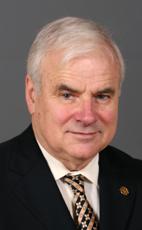Before I begin my personal remarks, I would like to join the other hon. members in recognizing the presence here today of the hon. member for La Pointe-de-l'Île. Welcome. It is a pleasure to see you.
I am honoured by the very kind comments that so many colleagues have made today.
I would like to thank you for your remarks. It has always been a pleasure for me to be here in the House. I have been grateful for this opportunity since I was elected by the voters in Kingston and the Islands in 1988.
I have really enjoyed being their representative in this House. I am honoured to have been able to do it for so long and so consistently, in the sense that they kept re-electing me. I have appreciated that support immensely. I am very pleased and honoured to have been the member of Parliament for such a great constituency, which is obviously Canada's first capital. It has been a privilege to serve my community of Kingston. I must say that I look forward to spending a little more time there, if there is a dissolution shortly.
I would also like to express my profound thanks to the Clerk of the House, as well as her predecessor, Bill Corbett, and his staff.
The Speaker must work with the Clerk all the times to arrange things in the House and to receive notices regarding things that happen here. The Clerk also acts as the Speaker's advisor.
Throughout, the Clerk and her officials have been very, very supportive and very, very helpful. Obviously, if I have been getting some credit for some successful decisions in the House, a lot of the credit goes to the table officers who do the work in preparing these things. I do not claim to do all that research myself. It is great.
I also want to say how much I appreciate the support of my fellow Chair occupants.
As Deputy Speakers, I have worked with: Bob Kilger; the current Minister of Transport; and Bill Blaikie. The member for Regina—Qu'Appelle is the current Deputy Speaker. We have had a very interesting association among the whole group of us in a way.
The Deputy Chairs of Committees of the Whole: Réginald Bélair; the hon. members for Hull—Aylmer and Ottawa—Orléans; and, currently, the hon. member for Victoria. I have enjoyed working with all of them.
Finally, the Assistant Deputy Chairs of Committees of the Whole: Eleni Bakopanos; Betty Hinton; Jean Augustine; and, currently, the hon. member for Haliburton—Kawartha Lakes—Brock. I thank them all for their assistance. As a team, in each case, I think we have worked very well together.
I would like to also thank all of the dedicated staff in my Kingston office who have worked hard to keep the constituents of Kingston and the Islands happy.
Once I became Speaker, the number of days I could spend there during the week diminished somewhat, so I have not had as many appointments in the last 10 years as I did in the years before that, but they have seen a lot of constituents and dealt with a lot of the issues and helped out.
The staff in the office here in Ottawa have also been very helpful, particularly in the Speaker's office, in assisting me in this role in helping arrange all the trips and the visiting delegations and the meetings with officials that I get to do on behalf of the House. I appreciate their help very, very much.
I thank the Leader of the Opposition for mentioning my old friend, Jerry Yanover. We were in high school together. I am sure he would have loved to be here today if he were still around.
I would like to thank my family, my five sisters, my brother, some of whom are here today, their spouses, their children, all of whom have helped me, and my mother. I am looking forward to again having a little more time to spend with them at the cottage when we get a break this summer. That will work out well.
I want to also thank all of you for having elected me so frequently as Speaker in this House. It has been a singular honour to serve in this position. I am always delighted with the support that I get during the elections, and of course elections are a real pain in the neck for Speakers, you have two every time. However, having been voted in, I do then have the pleasure of working with each one of the members.
It has always been a pleasure for me to have meetings and discussions with you and to receive little messages from time to time. I really appreciate the support you have given me and your good-naturedness. I also really appreciate the remarks you have made today.
Perhaps I could just end by telling a little story.
Toward the end of her long reign, Queen Elizabeth I, in an address to her subjects, said these words:
--though God hath raised me high, yet this I count the glory of my Crown, that I have reigned with your loves.
When you elected me to this job, you raised me high in this House, but what has been the wonderful part about it is the affection and the respect that you have showered upon me since my first election.
Thank you very much, my dear friends.

